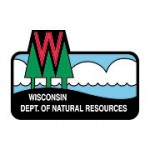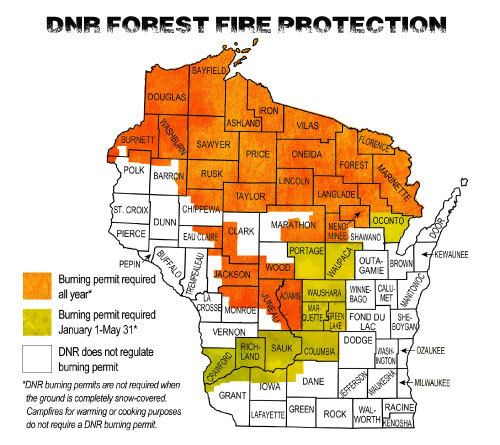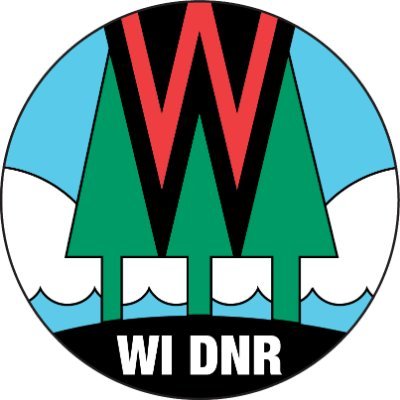Be Fire Smart: Get Your Free Burning Permit Now
Fire Danger Remains High For Parts Of Wisconsin
MADISON, Wis. – Now more than ever, our favorite outdoor spaces are playing an important role in our lives. Together, we can keep these safe places safe. Whether we are out in nature or home in our backyards, remember that it’s our role to protect the lands we love by preventing wildfires and recreating responsibly.
With weekend forecasts predicting warm temperatures, fairly low humidity and high winds, the Wisconsin Department of Natural Resources (DNR) expects fire danger to be high across the state this weekend.
“Weather is the single most important factor influencing how fires start and spread,” said Ron Weber, DNR Forester, adding seasonal warm and dry weather conditions increase wildfire activity. “Temperature, wind, humidity and precipitation are the key weather components that determine the daily fire danger.”
Fire danger is high today across much of the state including the following counties: Adams, Ashland, Barron, Bayfield, Brown, Buffalo, Burnett, Calumet, Chippewa, Clark, Door, Douglas, Dunn, Eau Claire, Fond du Lac, Green Lake, Iron, Jackson, Juneau, Kewaunee, La Crosse, Lincoln, Manitowoc, Marathon, Marquette, Monroe, Oneida, Outagamie, Pepin, Pierce, Polk, Portage, Price, Rusk, Sawyer, Sheboygan, St. Croix, Taylor, Trempealeau, Washburn, Waupaca, Waushara, Winnebago and Wood counties.
The DNR requires burning permits in many parts of the state to conduct legal and responsible burning outdoors. Burning permits are free and easy to obtain and protect lives, property and natural resources from the damages of wildfires.
Debris burning is the leading cause of Wisconsin’s wildfires. Fires caused by careless burning become more frequent this time of year. The 2021 fire season follows a winter with below-normal snow depths. Fire control officials are focusing on the potential for statewide fire activity as the snow is rapidly melting at the same time.
Wildfires can happen just about any time of the year, but historically, 60% of all annual wildfires in Wisconsin occur in March, April and May alone.
“Many people are eager to get outside to clean-up their properties by raking leaf litter, brush and needles, so it looks good and is ready for new growth,” Weber said. “Then, they choose to burn their debris pile. Consider composting yard waste or hauling it to an approved disposal site. Burning debris should always be the last alternative.”
Burning Permit Suspensions Are Based On Wildfire Risk
The DNR suspended all burning permits throughout spring 2020, Wisconsin’s peak for wildfires, due to increased safety concerns resulting from COVID-19. This year, the DNR plans to suspend burning based on wildfire risk. However, to promote social distancing, burning permits are not being issued in-person by Emergency Fire Wardens or at DNR service centers.
“Wildfires on the landscape will continue to occur despite the COVID-19 outbreak,” Weber said. “In an effort to increase public and firefighter safety and reduce human-caused ignitions or escapes, the department will take appropriate steps to prevent wildfires and minimize in-person contact both with the public and among fire personnel.”
Permits are free and can be obtained online and instantly emailed or issued over the phone and delivered by the Postal Service within three to five business days. Get your annual DNR burning permit by completing the online application here or by calling 1-888-WIS-BURN (947-2876).
Once an individual has a burning permit, remember to check the fire restrictions in the appropriate county after 11 a.m. each day before burning, including the legal burning hours, size limitations or if burning is suspended for the day. Small campfires for warming or cooking do not require a burning permit.
“It’s important to check the daily fire restrictions each day before you burn,” Weber said. “With a little planning and dedication to getting your burn permit and following the rules, we can all work together to prevent wildfires.”
Because the DNR does not regulate all areas across state, it’s essential to check with local municipal or fire department officials for any ordinances or other burning restrictions.
More information on burning permits, fire danger and preparing for wildfires around your home and property is available on the DNR’s burning restrictions webpage.
NOTE: This press release was submitted to Urban Milwaukee and was not written by an Urban Milwaukee writer. While it is believed to be reliable, Urban Milwaukee does not guarantee its accuracy or completeness.
























